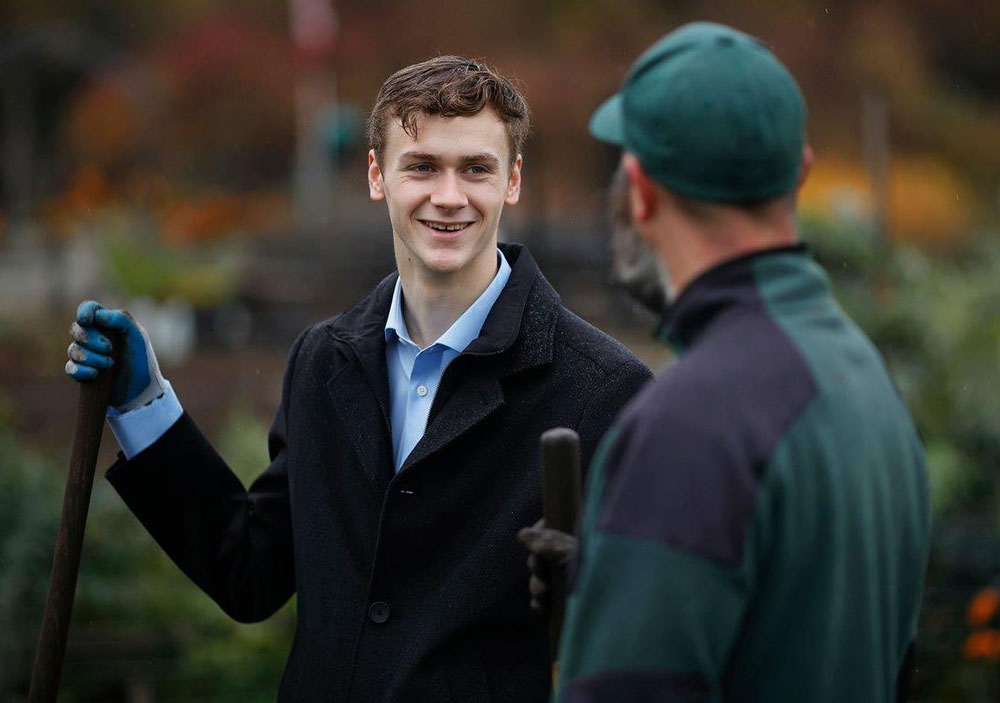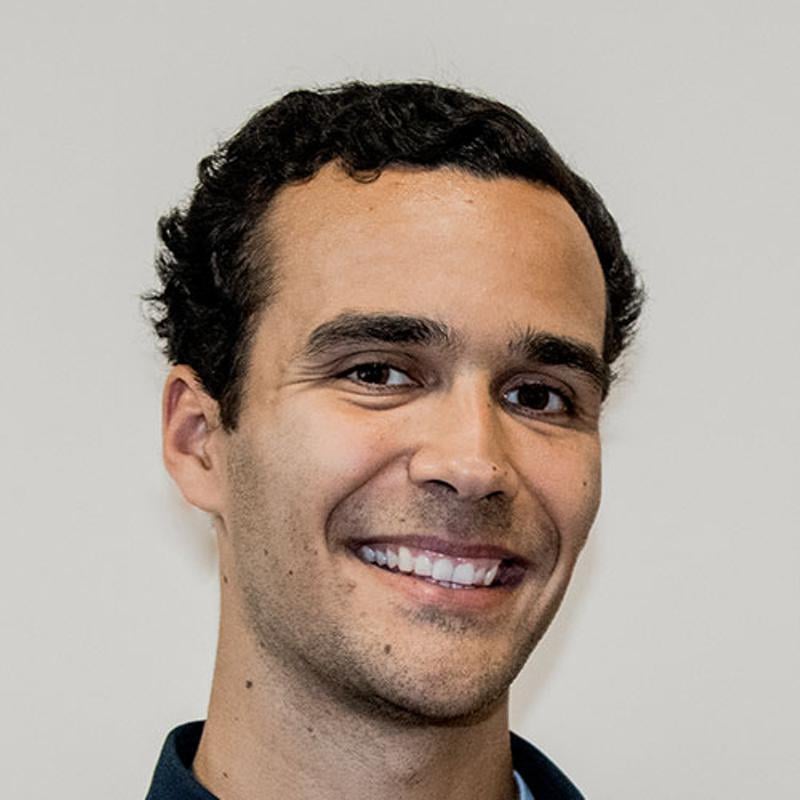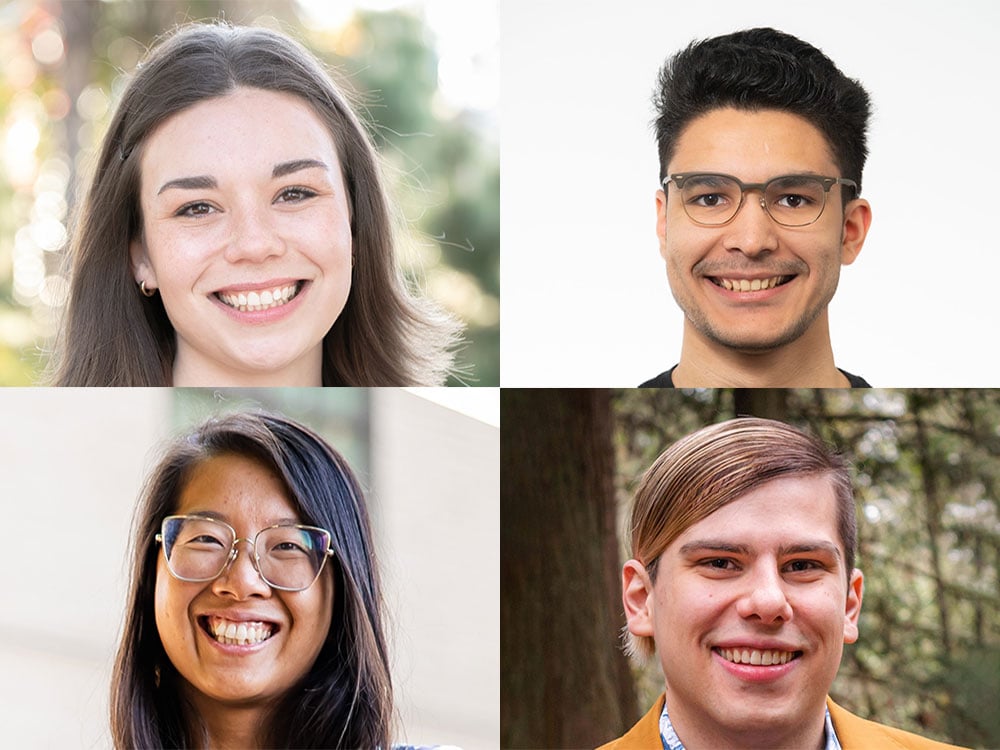Ned Taylor remembers when he became a politician. It was on a Tuesday. Inside a church. A few months after he graduated from Reynolds Secondary School in Saanich.
It was September 2017, and a byelection was underway to fill a Saanich council seat left vacant by the death of longtime councillor Vic Derman. Taylor was sitting behind folding plastic tables with nine other candidates at the first of two all-candidates meetings.
He wore a light blue shirt and dark tie. Clean-shaven, his dirty blond hair was gently combed to the right. At the makeshift table, he stood out like a sore thumb compared to the other candidates who were years, if not decades, older than him.
“I was incredibly nervous going into that all-candidates meeting,” Taylor says five years later. “I was very worried about being stumped on a question, or getting tripped up on my words.”
However, in front of about 300 people, Taylor realized he had a knack for public speaking. He articulated his points and the words came out of his mouth just as he had hoped.
He didn’t win that byelection, finishing fifth. Yet, at 18 and fresh out of high school, Taylor had a strong inkling his time would come. On the campaign trail he sensed there was quite an appetite for young blood on council.
“I was hearing it so often,” Taylor said. “If I would go out and knock on 20 to 30 doors, 20 or 25 people would say, ‘It’s great to see a young person.'”
One year later, his instincts proved right. He finished third among 18 candidates in the Saanich general election — claiming both a seat on council and the Capital Regional District board of directors.
“It was that all-candidates meeting that gave me the confidence to campaign… I went from being very nervous, perhaps a little more shy, to all of a sudden having the confidence to be a candidate.”
As Taylor, now 23, plans to step away from politics, a swath of young people in the Victoria region are following in his path. They’re dispelling the notion that politics are just for older people.

In Victoria’s suburbs, a swell of young candidates
Despite Taylor’s success four years ago, young people running for political office in B.C. is far from a new phenomenon.
Kevin Craig was 19 when he was elected to Kelowna city council in 2009. Twenty-four-year-old Blair Mirau was the youngest person elected to Prince Rupert city council in 2014. And one year after graduating from the University of Victoria, Zac de Vries was voted into Saanich council in 2018 at the age of 23.
The 2022 municipal election will see the lowest number of people running for local office in B.C. since 2008. But there’s a concentration of young people — 26 and under — running in the Victoria suburbs.
Basil Langevin, 26, and Jordan MacDougall, 23, are UVic students who announced early bids for Saanich council in the spring. Colby Harder, 26, is vying for a Langford city council seat, and 19-year-old Steven MacAskill is running for city council in Colwood.
Taylor’s successful 2018 campaign played a part in Langevin’s decision to run. Watching Taylor being elected, he said, showed him that it was possible for young people to have a seat at the political table.
“There’s a real need for fresh voices and people who are willing to make a better world,” Langevin said.
MacDougall, a Saanich council candidate who ran in last year’s federal election as a Green Party candidate, also credits Taylor and de Vries for inspiring him to run.
There’s also a camaraderie between the younger candidates who are supporting one another in their election bids this fall.
“We all support each other and it’s positive,” MacDougall said. “I met up with Basil to talk about stuff, Colby will write something up on my [Instagram] story and be like, ‘this is a nice idea.’”
Julia Harrison, a youth engagement co-ordinator at the City of Victoria Youth Council, believes social media, Victoria’s progressive attitude and ability to spark initiatives for enlivening civic engagement among youth is a reason for the uptick in political interest in the region.
“Victoria is such a unique place in that there’s so many policies consistently being pushed,” Harrison said. “Having space for youth to be a part of that and have their voices have an input and make a difference is huge.”
A focus on climate and housing
Many younger candidates in the capital region are leading platforms that target pressing issues defining their generation.
“When it comes to issues like climate change and housing affordability, young people are the generation most at risk,” Saanich council candidate Langevin said.
“Right now there are so few options for young people, single families, even seniors,” Colwood city council candidate MacAskill added. While he lucked out and secured a place to live in UVic student residence this year, one of his main campaign themes is to increase attainable housing in Colwood.
A common barrier for young candidates is that they may have less experience than folks who have been working in and around politics for decades.
“A lot of them are feeling the pressure to come up against what these more mature politicians believe to be the issues that youth are encountering, while not being youth themselves,” Harrison said.
Although all of the young candidates I interviewed have heard mostly positive responses to their campaigns, Langevin said a stigma still exists.
“We hear so often, especially from older generations, but just more generally, people complaining about young people being naive or overly optimistic,” Langevin said. “But seeing Ned and Zac come forward and win handily, it was a real sign that this is something I could be successful in.”
‘We need that representative democracy’
When Langford city council candidate Harder was in her late teens, she brought up a concern with an elected official.
The politician constantly referred to her as “sweetie” and “darling” and, although there was no malice intended, it made Harder feel less important. It made her realize that everyone has a different lived experience and that she wanted to share hers as a young woman.
“As a younger woman running, it’s been kind of funny going up to the door and getting asked, ‘Am I old enough?’ ‘Aren’t I supposed to be an old white man?’”
But Harder, who is also Métis, isn’t running to inspire the next generation of young women in particular. She wants to inspire the next generation of political leaders.
The last municipal elections in Vancouver, Toronto and Ottawa led to overwhelmingly white governments — despite the fact that diversity leads to more effective outcomes, from better financial results for businesses to involvement in politics.
Tesicca Truong, 28, is a candidate running for council in Vancouver who believes diversity is key to a city council.
For example, in Vancouver, she points out that a majority of the city’s councillors live in well-resourced areas of the central city. Those elected politicians may not have the same experiences as those people who live at different intersections of financial stability, cultural capital or housing security.
“In order for democracy to work, we need that representative democracy,” Truong said. “We need people who understand the issues, and not just understand them, but live them.”
Her father came to Canada as a refugee from Vietnam and her mother immigrated from Hong Kong. Truong grew up in the east side of Vancouver. One of the major reasons she is running is to inspire people with different backgrounds and who come from underrepresented areas of the city.
“I really hope that other folks who look like me, who are queer, who are young, who are racilized, who are women, who’ve never seen themselves represented in politics, can feel like they also have a place here,” Truong said.
“Of course I want to run and win, that’s the goal. But, in addition to that, I want to inspire other folks like me to run.”
'It takes so much out of you'
As teenagers or 20-somethings, most young politicians are either still in school, recently out of school or in the midst of a self-discovery phase of their lives.
The heavy workload and desire for personal growth has led some to leave politics altogether.
Four out of the five lead directors resigned from the University of Victoria Students' Society earlier this year, prompting the student board to look into the impact of burnout on its student leaders. In the 2020-21 academic year, five directors from the UVic student society also resigned.
Twenty-one-year-old Gabriel Liosis, a student at Simon Fraser University, is now running for a spot on the Maple Ridge-Pitt Meadows school board. In January, however, he resigned as president of the Simon Fraser Student Society due to mental health challenges.
Although he loved the job and loved advocating for people his age, he realized that if he couldn’t look after himself, he couldn’t look after others.
“It takes so much out of you,” Liosis said. “When you’re around my age, you’re still learning a lot about yourself, how you interact with others, your work ethic, how you balance your personal life with your work life.”
After briefly stepping away from the political scene, Liosis announced his school board candidacy in the summer.
Like Harder, he didn’t enter politics to inspire a certain subset of young people. Instead, he views himself as a candidate with a desire to represent the community he grew up in — and who just happens to be young.
Stepping away gave him time to reflect on how he could combat future bouts of burnout.
“I think of myself as an introvert, so socializing drains me quite quickly,” Liosis said. “For someone running for office, that can be a little concerning at times. What you need to figure out is what fills your cup and what drains it.”
‘Scare the hell out of politicians’
Taylor is not running for a second term on Saanich council. He hopes to pursue a career in aviation and “acquire more global perspectives while he’s still young.” But he isn’t ruling out a return to politics.
As he spends his final days as a Saanich councillor, he’s inspired by the young candidates in the region putting their names on the ballots this election.
However, he’s concerned about the lack of youth who are going out to vote.
In the last municipal election in Vancouver, people aged 18 to 24 and 25 to 34 had the two lowest turnout rates by age group.
But there are hints that the tide might be turning.
Four years ago, City of Vancouver staff introduced a series of new outreach programs that included social media posts by influencers to increase election education and awareness for historically low voting demographics like youth.
All age groups in Vancouver saw a decline in voter turnout in 2018 compared to 2014. But people aged 25 to 34 experienced a tiny improvement. In an election summary report published in 2019, the city indicated that the result pointed to the effectiveness of the outreach methods.
Regardless of how many young candidates make it into office this year, to make progress on the issues that are most pertinent to them, Taylor believes that more young people need to vote.
“I hope that with myself and other young people running and getting elected to political office, that will help improve voter turnout among young people,” Taylor said.
“I would really like to see young people scare the hell out of politicians, at all levels of government, by coming out in massive numbers and voting.” ![]()
Read more: Municipal Elections 2022, Municipal Politics


















Tyee Commenting Guidelines
Comments that violate guidelines risk being deleted, and violations may result in a temporary or permanent user ban. Maintain the spirit of good conversation to stay in the discussion.
*Please note The Tyee is not a forum for spreading misinformation about COVID-19, denying its existence or minimizing its risk to public health.
Do:
Do not: